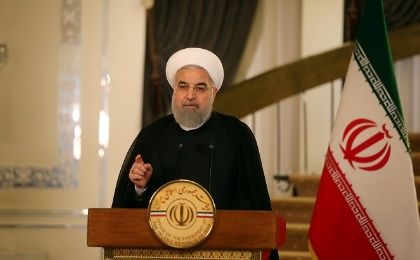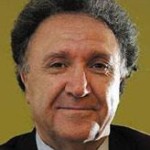Rouhani defends IRGC and Iran’s malign activities: He must be sanctioned

By Perviz
Khazai*
The United States enforces sanctions on authorities, entities, and government
institution based on U.S. foreign policy and national security goals against a wide array of targets, terrorists, and those engaged in activities related to
the proliferation of weapons of mass destruction.
Sanctions
have been a significant component of U.S. Iran policy since Iran’s 1979 Islamic
Revolution that toppled the Shah of Iran, a U.S. ally. Trump Administrations
have used sanctions extensively to try to change Iran’s behavior. Sanctions
have had a substantial effect on Iran’s economy.
On
Aug.6,2019 State department BUREAU OF NEAR EASTERN AFFAIRS reported to Congress
List of sanctioned Persons or entities Who
Are Responsible for or Complicit in Certain Human Rights Abuses in Iran
On July
31, 2019, The United States sanctioned Iranian Foreign Minister Mohammad Javad
Zarif.
Senior
administration officials said that the designation was due to Zarif’s actions
on behalf of Iran’s Supreme Leader Ayatollah Ali Khamenei, whom the
administration sanctioned in late June.
Some in
the West view Hassan Rouhani, the president of the Iranian regime, as a
moderate figure. But Rouhani’s actions and history indicate to the exact
opposite and prove that he is part the mullahs’ maligns behavior
Rouhani
praised the Islamic Revolutionary Guard Corps (IRGC) for firing at the U.S.
drone, and said, “we hit the drone with a system that is constructed in Iran,
its missile is made by Iran, its radar is made by Iran, that is, we searched
with our Iranian radar, we locked with Iranian radar, we targeted it with our
Iranian missile … We kiss the hands of all those who created this domestic
industry in the Ministry of Defense, the hands of all who used this tool well
in the Revolutionary Guards.”
A few
months after the nuclear deal, he confessed to leverage the presence in Syria
and Iraq to get concessions in the nuclear talks. He said: “If our brave
commanders did not stand in Baghdad and Samarra, and Fallujah and Ramadi, and
if they did not help the Syrian government in Damascus and Aleppo, we would not
have the security to be able to negotiate so well” (Feb. 8, 2016).
“Today, if
we look at every corner in Afghanistan, Iraq, Syria, Lebanon, Palestine,
everywhere, we see the footprint of the bravery of Commander [Qassem]
Soleimani,” Rouhani said on May 10, 2016, adding that “the Islamic
Revolutionary Guard Corps (IRGC) is present to defend our holy shrines in Iraq
and Syria, to defend the oppressed in Lebanon, in Palestine, in Afghanistan,
and other places that request assistance from the Iranian people and the
Iranian government.” (Quds Force Tasnim News Agency, May 10, 2016).
“We built,
are building now, and will build missiles… We do not hesitate to build,
manufacture, store, and use when necessary to defend ourselves, any weapons of
any kind that we need,” Rouhani said on October 29, 2017, in the clerical
regime’s Parliament. He added that the United States disturbed the security of
Syria, the security of Lebanon, the security of Iraq and the stability and
security of Afghanistan, and wanted to “break down Iraq”, and we “went to help
the Iraqi people, to help the Syrian people and we did not allow “the territorial integrity of Iraq to be undermined.”
Since
July 1980, Rouhani has been calling for the execution of political dissidents
in the Friday prayers in public, “Just as we punish adulteries in public so
that everyone would witness their suffering, we should hang political
dissidents at the Friday prayers to have more impact on society.”
As the
secretary of the Supreme Security Council in 1999, he played a major role in
suppressing the uprising of Tehran’s students and people.
Rouhani
was the first official to force women to wear compulsory hijab at work, “I
ordered all the women to wear a hijab at work… I issued an ultimatum that no
woman is allowed to come to work without a hijab… The women protested and
shouted. Someone said it’s impossible… I stood firm and obligated them to wear
the hijab at work,” he proudly recalled in an interview.
Additionally,
over 3000 people, including 91 women, were executed under Rouhani.
In the
nuclear field, Rouhani wrote in his book “National Security and Nuclear
Diplomacy”, that everything was going well in Natanz, and experts had planned
to launch 54,000 centrifuges by March 2003, when the MEK press conference in
the summer of 2002 created a fuss.
The Daily
Telegraph wrote on March 5, 2006: In 2006, he (Rouhani) admitted that in
negotiations with European Troika “how Tehran played for time and tried to dupe
the West after its secret nuclear program was uncovered by the Iranian
opposition in 2002.”
Rouhani’s
statement and his history double the need to sanction Rouhani and place him on
terrorist lists.

*Perviz S. Khazai is a law graduate and former
Apprentice diplomat in French Ministry of Foreign Affairs- in IIAP(ENA)Paris,
in United Nations in Geneva- In Red Cross International- In Council of Europe
in Strasbourg and International Court of Justice in The Hague 1969-1971. He
served as an international law expert of foreign affairs in Tehran 1976-1979.
He served as the head of the mission and acting ambassador in Norway and Sweden
in 1979-1982. He is now representative of NCRI in northern Europe.












No comments:
Post a Comment